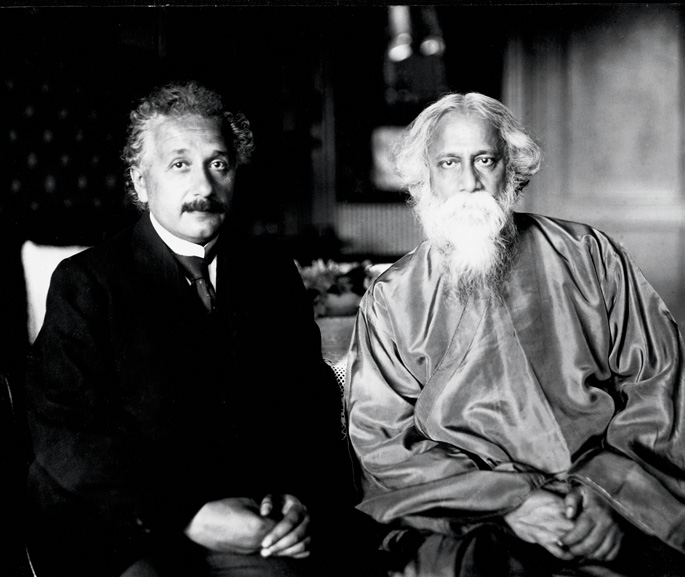Einstein in Caputh: Not giving a damn

In 1931 Einstein sent his son Eduard an invitation to Caputh in the form of a four-line doggerel:
Sei ein gutes faules Tier,
Streck alle Viere weit von Dir.
Komm nach Caputh, pfeif auf die Welt,
Und auf Papa, wenn Dirs gefällt.
According to Einstein, Caputh was a place where one could be lazy (sei ein gutes faules Tier) and not give a damn about the world (pfeif auf die Welt). If this characterization was true for some, it didn´t apply to Einstein himself. The self-described loner with a country retreat never ceased advocating social and political causes. If anything, his efforts only intensified. While Einstein had already demonstrated his commitment to pacifism in 1914, when he was one of only four Berlin intellectuals to sign an appeal criticizing the role of Germany in World War I, he spoke out against war all the more vociferously during his Caputh years, exhorting citizens to refuse military service even in peacetime. Whenever a young man was arraigned in court for refusing to serve, Einstein would raise his voice, writing to ministers and to military courts. When widespread attacks by Arabs on Jews in Jerusalem broke out in late summer of 1929, Einstein condemned the Arabs but urged for a fair settlement and protested the death sentences handed out to the perpetrators. Without peaceful cooperation, he wrote to Chaim Weizmann, the head of the World Zionist Federation and later first president of Israel, we would have learned nothing from our 2000 years of suffering.
Of the extensive correspondence Einstein carried out from Caputh was a letter to Mahatma Gandhi in support of his non-violent resistance and two letters to Sigmund Freud, one to ask his opinion about the effectiveness of an international association of upstanding intellectuals to promote peace, the other as part of a public exchange of views on whether war can be eradicated. For Einstein, achieving peace depended on achieving internationalism, the unconditional surrender of every nation of its liberty of action or of its souvereignty. In the summer of 1930 Einstein delivered an address broadcast to millions of listeners in which he expressed hope that radios ability to cross political boundaries could someday reconcile nations.
When the Nazis became Germanys second largest political party later that September, winning 107 seats in the Reichstag, Einstein declared their victory „a childhood disease of the Republic“. As conditions worsened throughout the next two years, however, he realized it was a disease that wouldn´t be easily outgrown. Einstein acted by turning toward the far left, despite his reservations about communism. He signed appeals by the Rote Arbeiterhilfe and agreed to a request from the writer Anna Seghers to hold a lecture at the Marxist Workers College. In 1932 Heinrich Mann and Käthe Kollwitz visited Einstein in Caputh to ask him to support their manifesto urging antifascist solidarity among union leaders, social democrats, and communists. Mann and Kollwitz knew that there was no public figure in the Weimar Republic whose name could lend greater moral authority to their cause.
Einstein´s social activism went beyond concerns about militarism and the danger of fascism to general instances of injustice. In the summer of 1931 alone his attention was turned to four cases: he joined an international group in support of eight black Alabama youths sentenced to death for raping two women, despite testimony by doctors who had examined the women that no rape had occurred; he appealed to the governor of California to free Tom Mooney, a labor activist who was serving a life sentence based on perjurious testimony; he protested attempts of right-wing students in Berlin to seek dismissal of a pacifist professor; and, together with Heinrich Mann, he wrote a letter to The New York Times that accused Serbian king Alexander I for his role in the assassination of a prominent Croatian intellectual.
Not all of Einstein´s activities in Caputh carried the same gravitas. In addition to enjoying his sailboat and house, Einstein led the life of the mind. On the one hand, there was science. He wrote eight theoretical papers (most of which were attempts to find causality in the apparent randomness of quantum phenomena), published tributes to Johannes Kepler and James Clark Maxwell, and met with friends and colleagues from the Prussian Academy of Sciences, many of whom were or would later become Nobel prize laureates in physics and chemistry. On the other hand, there were the humanities. Einstein´s interests were never limited to science, but at Caputh he started venturing further afield. His guests were diverse. The painter Max Liebermann, the critic Alfred Kerr, and the conductor Erich Kleiber all visited Caputh. In the summer of 1930, Einstein received the Nobel prize-winning poet Rabindranath Tagore, with whom he discussed the nature of causality and the relative merits of Western and Eastern music. Also in Caputh, Einstein began publishing on religion and philosophy. A piece he wrote for The New York Times Magazine discussed various kinds of religious experience. In 1932 the German League of Human Rights asked Einstein to make a recording of an another piece, titled „The World as I See It“. The essay is only two pages long, but none of Einstein´s other writings gives a better summary of his philosophical and political views, from his belief in determinism to his embrace of the individual, from social democracy on the secular level to pantheism on the spiritual. One passage in particular suggests how life in Caputh fits into the larger picture:
„My passionate sense of social justice and social responsibility has always contrasted oddly with my pronounced lack of need for direct contact with other human beings and human communities. I am truly a solo-traveller and have never belonged to my country, my home, my friends, or even my immediate family, with my whole heart; in the face of all these ties, I have never lost a sense of distance and a need for solitude.“